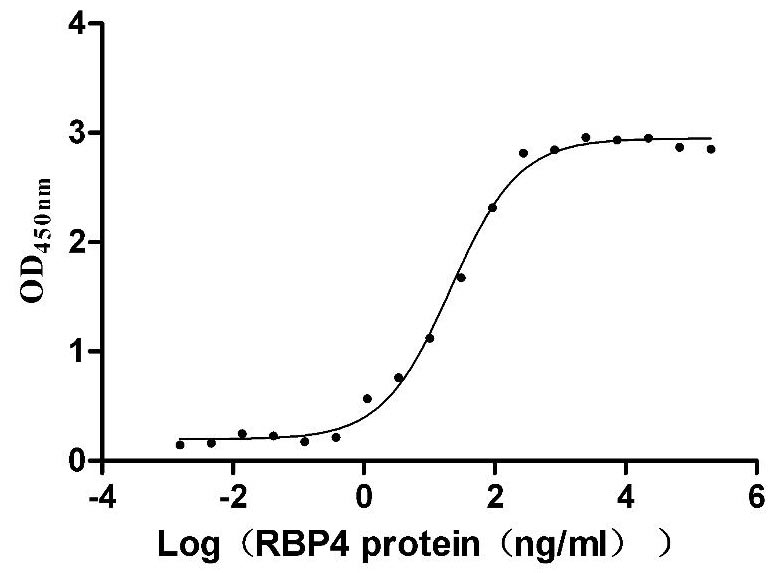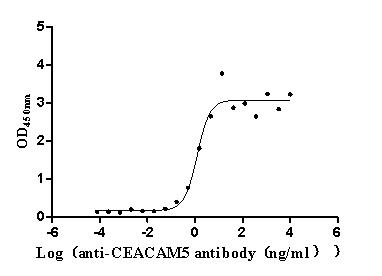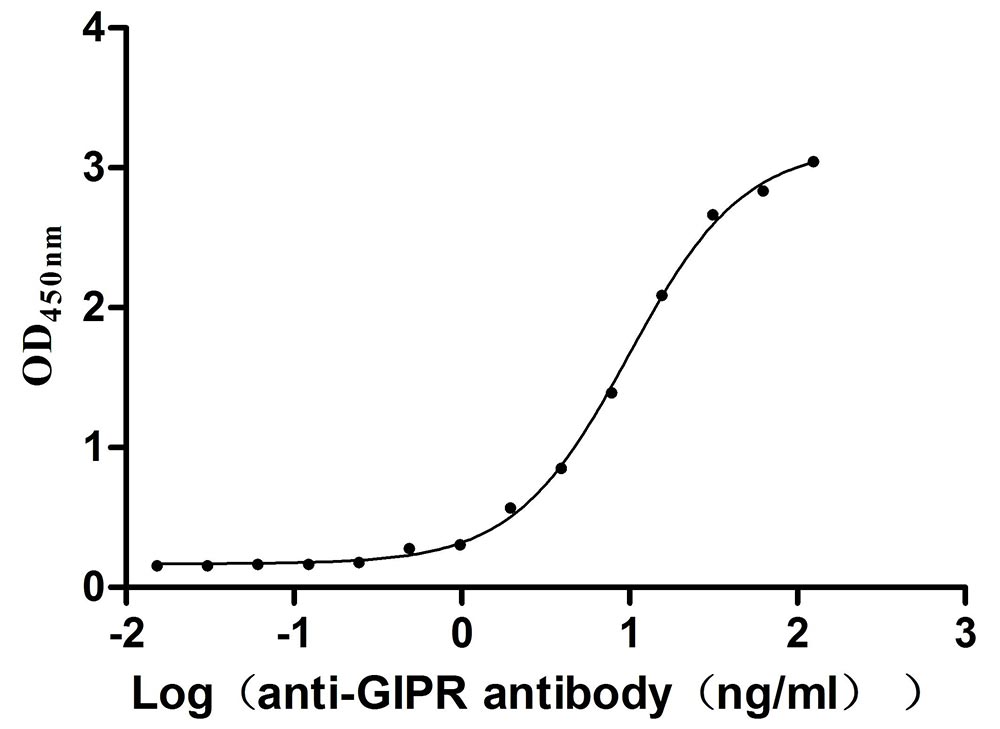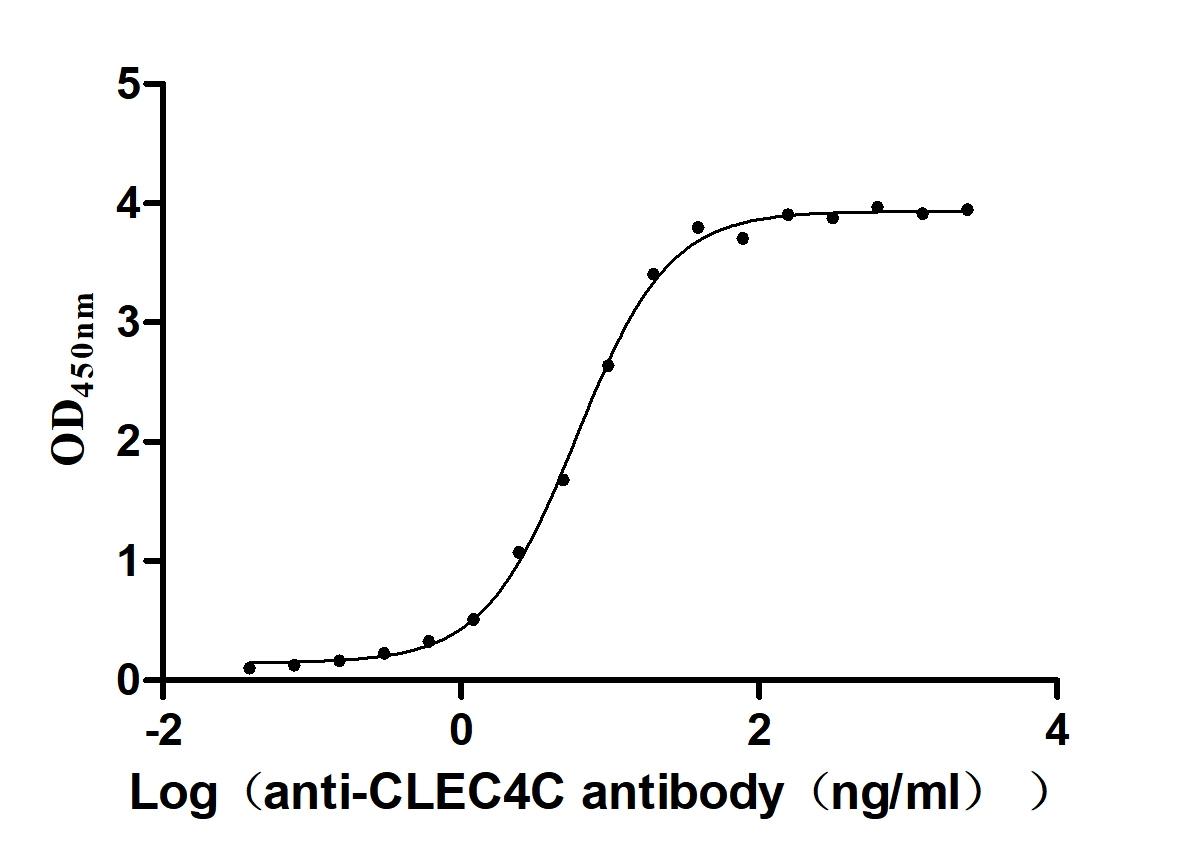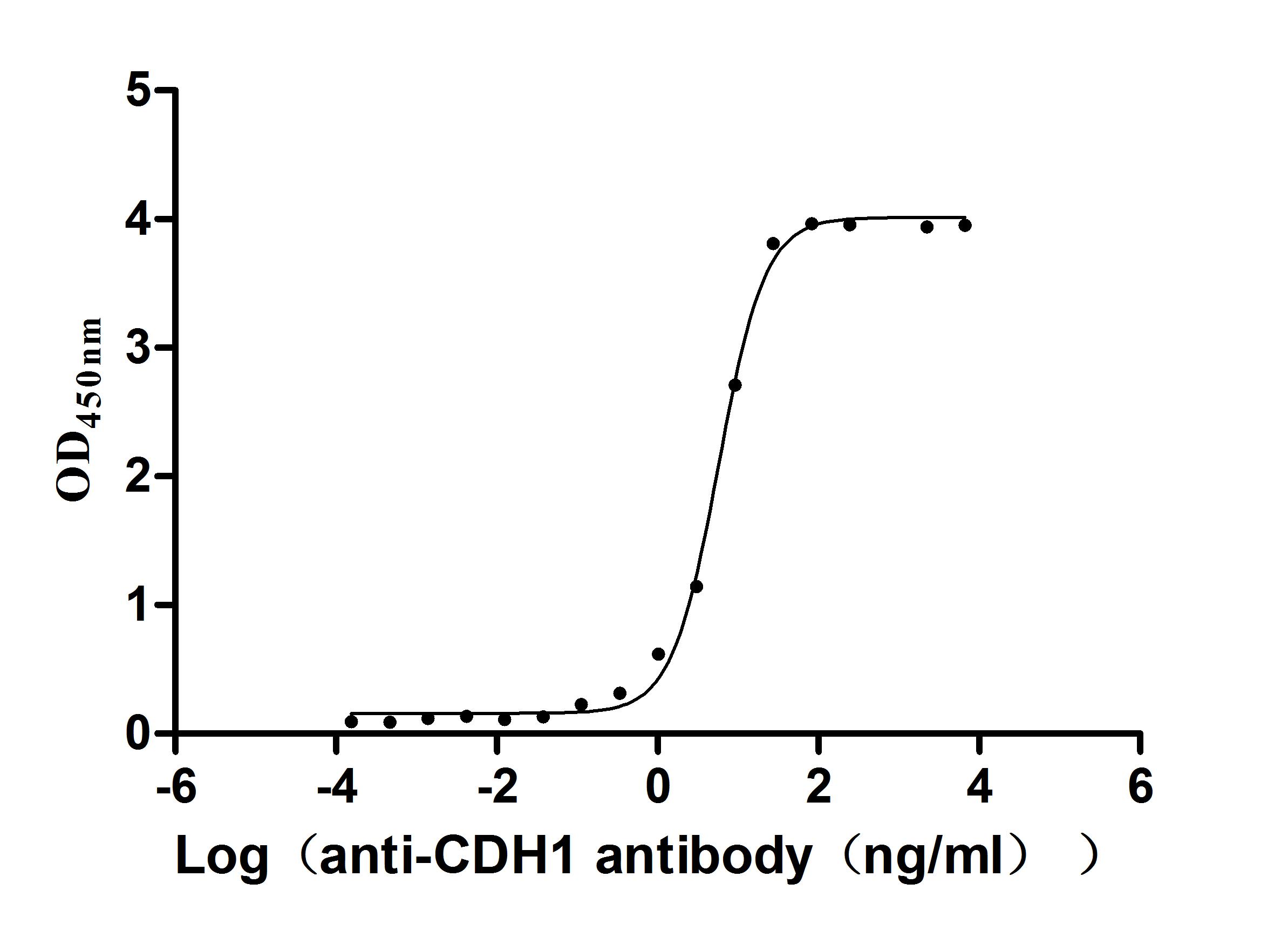Recombinant Human C-C chemokine receptor type 4 (CCR4) (Active)
In Stock-
货号:CSB-CF004843HU
-
规格:¥6240
-
图片:
-
其他:
产品详情
-
纯度:Greater than 85% as determined by SDS-PAGE.
-
生物活性:Measured by its binding ability in a functional ELISA. Immobilized Human CCR4 at 5 μg/mL can bind Anti-CCR4 recombinant antibody(CSB-RA004843MA01HU), the EC50 is 7.818-21.25 ng/mL.
-
基因名:
-
Uniprot No.:
-
别名:CCR4; CMKBR4; C-C chemokine receptor type 4; C-C CKR-4; CC-CKR-4; CCR-4; CCR4; K5-5; CD antigen CD194
-
种属:Homo sapiens (Human)
-
蛋白长度:Full Length
-
来源:in vitro E.coli expression system
-
分子量:44.9 kDa
-
表达区域:1-360aa
-
氨基酸序列MNPTDIADTTLDESIYSNYYLYESIPKPCTKEGIKAFGELFLPPLYSLVFVFGLLGNSVVVLVLFKYKRLRSMTDVYLLNLAISDLLFVFSLPFWGYYAADQWVFGLGLCKMISWMYLVGFYSGIFFVMLMSIDRYLAIVHAVFSLRARTLTYGVITSLATWSVAVFASLPGFLFSTCYTERNHTYCKTKYSLNSTTWKVLSSLEINILGLVIPLGIMLFCYSMIIRTLQHCKNEKKNKAVKMIFAVVVLFLGFWTPYNIVLFLETLVELEVLQDCTFERYLDYAIQATETLAFVHCCLNPIIYFFLGEKFRKYILQLFKTCRGLFVLCQYCGLLQIYSADTPSSSYTQSTMDHDLHDAL
-
蛋白标签:N-terminal 10xHis-tagged
-
产品提供形式:Liquid or Lyophilized powder
Note: We will preferentially ship the format that we have in stock, however, if you have any special requirement for the format, please remark your requirement when placing the order, we will prepare according to your demand. -
缓冲液:Lyophilized from Tris/PBS-based buffer, 6% Trehalose, pH 8.0
-
储存条件:Store at -20°C/-80°C upon receipt, aliquoting is necessary for mutiple use. Avoid repeated freeze-thaw cycles.
-
保质期:The shelf life is related to many factors, storage state, buffer ingredients, storage temperature and the stability of the protein itself.
Generally, the shelf life of liquid form is 6 months at -20°C/-80°C. The shelf life of lyophilized form is 12 months at -20°C/-80°C. -
货期:3-7 business days
-
注意事项:Repeated freezing and thawing is not recommended. Store working aliquots at 4°C for up to one week.
-
Datasheet & COA:Please contact us to get it.
相关产品
靶点详情
-
功能:High affinity receptor for the C-C type chemokines CCL17/TARC, CCL22/MDC and CKLF isoform 1/CKLF1. The activity of this receptor is mediated by G(i) proteins which activate a phosphatidylinositol-calcium second messenger system. Can function as a chemoattractant homing receptor on circulating memory lymphocytes and as a coreceptor for some primary HIV-2 isolates. In the CNS, could mediate hippocampal-neuron survival.
-
基因功能参考文献:
- the expression of chemokine receptors in different peripheral blood T-cell subsets in patients with polymyositis (PM) and dermatomyositis, was examined. PMID: 28869080
- This review presents key clinical studies of Multiple sclerosis together with experimental studies in animals that have demonstrated functional roles of CCR4, CCL17, and CCL22 in experimental autoimmune encephalomyelitis pathogenesis. [review] PMID: 29099057
- Taken together, our data showed a likely positive feedback mechanism of enhanced IL-6 production in ectopic milieu. The high levels of IL-6 in the peritoneal cavity stimulate the expression of CCL17 in endometrial stromal cells by activating JNK signal pathway, and then, CCL17 further induces CCR4 expression on macrophages, which eventually leads to an increase in IL-6 production via NF-kappaB activation. PMID: 28240436
- Investigations showed that the level of CCR4 could be induced by TNF-alpha dependent of NF-kappaB activation in CRC cells. CCR4 might be implicated in TNF-alpha-regulated cancer cells metastasis. PMID: 27356745
- Tumor-associated macrophages promote prostate cancer migration through activation of the CCL22-CCR4 signaling axis. PMID: 28039457
- monocyte chemoattractant protein-1 (MCP-1), an endogenous CCR4-binding ligand, was specifically upregulated in the head and neck squamous cell carcinomamicroenvironment compared to the other four CCR4-binding ligands PMID: 27177223
- A CCR4 antagonist reverses the tumor-promoting microenvironment of renal cancer PMID: 28134623
- The percentage of CXCR3(+) CD4(+) TEM cells negatively correlated with the severity of the cutaneous disease in psoriasis patients. Importantly CLA(+) CD4(+) TCM cells expressing CCR6(+) or CCR4(+)CXCR3(+) negatively correlated with psoriasis severity suggesting recruitment to the skin compartment. PMID: 28392462
- Case Report: CCR4+ T-cell depletion by mogamulizumab treatment of adult T-cell leukaemia/lymphoma results in CD8-positive T-cell mediated dermatitis. PMID: 27786349
- CCL22-specific antibodies reveal that engagement of two distinct binding domains on CCL22 is required for CCR4-mediated function. PMID: 26683175
- CCR4 mutation is an important determinant of the clinical course in ATLL cases, and that NS and FS mutations of CCR4 behave differently with respect to ATLL pathophysiology. PMID: 26847489
- Distinctive Treg associated CCR4-CCL22 expression profile with altered frequency of Th17/Treg cell in the immunopathogenesis of Pemphigus Vulgaris. PMID: 26093920
- Data show that CCR4 was over-expressed in lymph node-negative human gastric cancer tissues and suggest its involvement in promoting tumor invasion probably, through up-regulation of MMP9. PMID: 25790118
- CCR4 C1014T and CCL22 C16A genetic variations were neither associated with the risk, nor with the progression of colorectal cancer in Iranian population PMID: 25148803
- Higher percentages of CCR4+ CD4 TEM cells in acute RSV infection were accompanied with higher percentages of CXCR3+ CD8 TEM cells, whereas the development of long-lived memory CXCR3+ CD4 and CD8 TCM cells seems to be compromised PMID: 25013801
- These findings implicate somatic gain-of-function CCR4 mutations in the pathogenesis of adult T cell leukemia/lymphoma. PMID: 25488980
- CCR4 has a role in tumor aggressive behavior in renal cell carcinoma PMID: 24554520
- Data show that CCR4 exists in at least two distinct conformations, which are differentially activated by ligand. PMID: 24563252
- CCR4 mediates CCL17 induced cell migration via increased total RhoA and active RhoA protein levels in colon cancer cells. PMID: 23649168
- Anti-CCR4 monoclonal antibody treatment is instrumental for evoking and augmenting antitumor immunity in cancer patients by selectively depleting eTreg cells. PMID: 24127572
- s identify an evolutionarily conserved C-terminal motif in human TTP that directly binds a central domain of CNOT1, a core subunit of the CCR4-NOT complex. PMID: 23644599
- lymph node metastasis of CCR4(+) HNSCC is promoted by CCL22 in an autocrine or M2-like macrophage-dependent paracrine manner. PMID: 23180648
- CCR4+ memory T-cell frequency is increased in patients with Wegener's granulomatosis with polyangiitis. PMID: 22490506
- CCR4-, CCR5-, CXCR3-, and selectin ligand-expressing CD4+ T cells preferentially accumulate in the joints of children with juvenile idiopathic arthritis. PMID: 21739422
- A high amino acid charge of the envelope glycoprotein 120 V3 region is important for binding to host CXCR4 receptor. PMID: 21525208
- aberrant expression of CCR4 in human gastric cancer could contribute to tumor-induced immunosuppression. PMID: 21443538
- Lymphocyte CCR4 expression is closely associated with induction of human allergen-induced late nasal responses. PMID: 20148806
- high-level lineage-independent induction of CCR4 can occur following T-cell activation without accessibility-associated changes in histone H3, but that without such changes expression is transient rather than persistent. PMID: 20963786
- We suggest that CCR4 and CCR6 expression on CD4(+) T cells should be considered as markers of disease activity in systemic lupus erythematosus. PMID: 20334681
- CD4+CD25high Treg cells of Wegener granulomatosis-patients exhibited decreased numbers of cells co-expressing FoxP3 and CCR4 PMID: 20412707
- CCR4 might play a role in allergen-driven T helper type (Th)2 cell accumulation in asthmatic airways. PMID: 20237293
- CCR4 ligands secreted by dendritic cells recruit regulatory T cells (Tregs) to sites of inflammation in patients with autoimmune and chronic hepatitis. PMID: 20164417
- Data show that MDC/CCL22 is present in the synovial membrane of rheumatoid arthritis (RA) and psoriatic arthritis (PsA) patients and in synovial fluid of patients with RA and PsA, which would enable migration of CCR4 expressing memory cells. PMID: 19942450
- Data show that TH treatment promoted rapid and sustained hCCR4 recruitment to the TH-responsive deiodinase 1 promoter and TR co-localizes with hCCR4 in the nucleus and interacts with hCCR4 in 2-hybrid and pull-down assays. PMID: 19903885
- CCR4 is expressed with high frequency in adult T-cell leukemia and human T-cell leukemia virus type 1-transformed T cells and in ATL skin lesions. PMID: 11861261
- CCR4 is mainly expressed by a high cytokine (interleukin-4/interleukin-2)-producing (CD4) subset of natural killer t-cells. PMID: 12070001
- The skin-homing TH compartment is itself divided into distinct subpopulations, the smaller of which expresses both CCR4 and CCR10, and the larger of which expresses only CCR4. PMID: 12406880
- CCR4+ cells were present predominantly in the lesional skin of atopic dermatitis patients, but not in the non-lesional skin PMID: 12456591
- In the blood of cutaneous T cell lymphoma patients with peripheral blood involvement we found significantly increased percentages of T cells displaying the skin-homing phenotype (CLA+CCR4+) compared with healthy individuals. PMID: 12485447
- Increased expression of CCR4, which is proposed to guide CD25(+) Ts cells to DC, is an intrinsic feature of CD25(+) Ts cells. PMID: 12778466
- airway allergen-specific T(H)2 cells are CCR4(+), but in the atopic child CCR4 does not distinguish between recall antigen and allergen specificity PMID: 14657875
- although there is PI(3,4,5)P(3) accumulation downstream of CCR4, phosphoinositide 3-kinase activity is a dispensable signal for CCR4-stimulated chemotaxis of Th2 cells and the CEM T cell line. PMID: 15187160
- CXCR3 and CCR4 were heterogeneously expressed in peripheral T-cell lymphomas. PMID: 15328188
- CC chemokine receptor 4 has a role in adult T-Cell leukemia/lymphoma PMID: 15569983
- review of possible relationship of CCR4 role in T cell migration and skin infiltration in ATL, and of selective expression of CCR4 by Th2 and regulatory T cells and possible origin of ATL in Th2 or regulatory T cells. PMID: 15621800
- CCR4 and TARC/CCL17 play role in pathophysiology of cutaneous lupus erythematosus(CLE). Cytotoxic CD8+ T cells expressing CCR4 appear to be involved in scarring subtypes of CLE. PMID: 15955100
- CCR4 and CCR10 may play an important role in ATLL invasion into the skin PMID: 17071491
- Bexarotene reduces CCR4-positive lymphocytes. PMID: 17546636
- aberrantly expressed Fra-2 in association with JunD may play a major role in CCR4 expression and oncogenesis in adult T-cell leukemia. PMID: 18071306
- CCR4 and CCR10 are expressed on epidermal keratinocytes and that both are functional in terms of skin cytokine production and/or migration to their ligand CCL17 and CCL27, respectively. PMID: 18782672
显示更多
收起更多
-
亚细胞定位:Cell membrane; Multi-pass membrane protein.
-
蛋白家族:G-protein coupled receptor 1 family
-
组织特异性:Predominantly expressed in the thymus, in peripheral blood leukocytes, including T-cells, mostly CD4+ cells, and basophils, and in platelets; at lower levels, in the spleen and in monocytes. Detected also in macrophages, IL-2-activated natural killer cell
-
数据库链接:
HGNC: 1605
OMIM: 604836
KEGG: hsa:1233
STRING: 9606.ENSP00000332659
UniGene: Hs.184926
Most popular with customers
-
Recombinant Human T-cell surface protein tactile (CD96), partial (Active)
Express system: Mammalian cell
Species: Homo sapiens (Human)
-
Recombinant Mouse Transthyretin (Ttr) (Active)
Express system: Mammalian cell
Species: Mus musculus (Mouse)
-
Express system: Mammalian cell
Species: Homo sapiens (Human)
-
Recombinant Mouse Gastric inhibitory polypeptide receptor (Gipr), partial (Active)
Express system: Mammalian cell
Species: Mus musculus (Mouse)
-
Recombinant Macaca fascicularis C-type lectin domain family 4 member C(CLEC4C), partial (Active)
Express system: Mammalian cell
Species: Macaca fascicularis (Crab-eating macaque) (Cynomolgus monkey)
-
Recombinant Human Dipeptidase 3(DPEP3), partial (Active)
Express system: Mammalian cell
Species: Homo sapiens (Human)
-
Recombinant Human Cadherin-1(CDH1),partial (Active)
Express system: Mammalian cell
Species: Homo sapiens (Human)

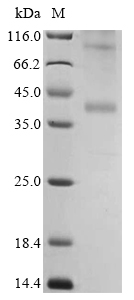
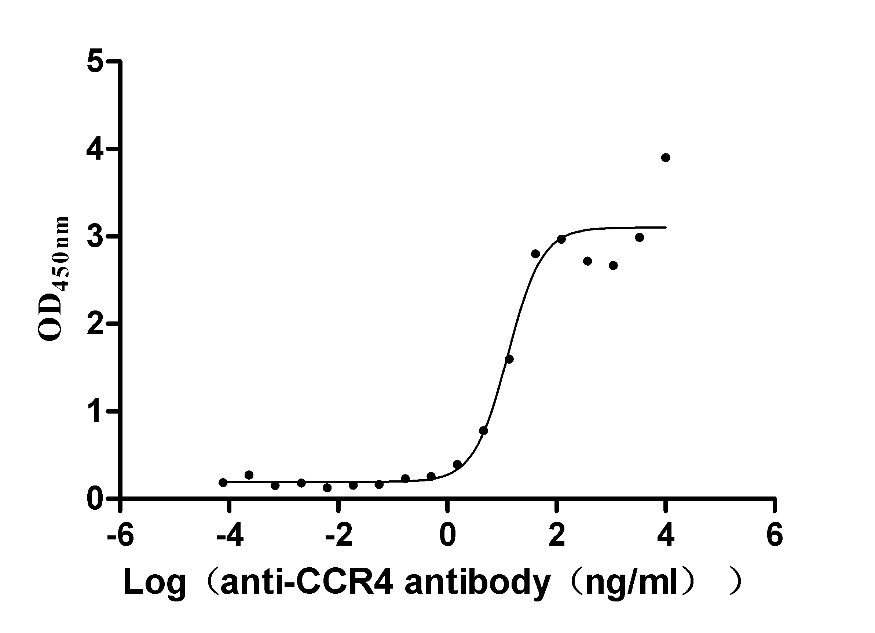

-AC1.jpg)
